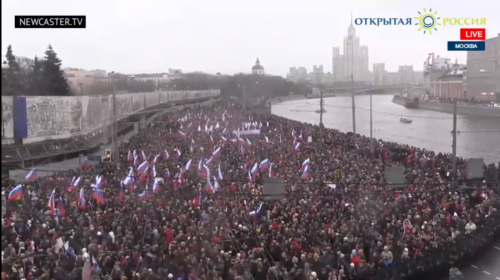PHOTO: 10,000s of Russians march in Moscow on Sunday, protesting the Putin regime and honoring slain Boris Nemtsov
News from Russia has been dominated since Friday night by the murder of opposition leader Boris Nemtsov.
As we await Sunday’s demonstration in Moscow — planned before Nemtsov’s assassination but now taking on added meaning — an assessment from Max Seddon of BuzzFeed about the significance of the killing in the Russia of President Vladimir Putin:
The gangland-style murder of top Putin critic Boris Nemtsov on Friday night seemed like something from the bygone, lawless Moscow of old, when biznesmeny dropped like flies in the no-holds-barred scramble for Russia’s post-Soviet riches. Unknown men drew up in a car, shot him in the back four times, and escaped. Camera operators and photographers gathered around his body as it lay for two hours on a bridge just behind the Kremlin, with the onion domes of St. Basil’s Cathedral in the background.
If anything, though, Nemtsov’s death marks yet another nail in the coffin of the Russia of the 1990s and the hopes it could emerge to become a free, democratic liberal, Western — just “normal” — country. Back then, Nemtsov, 55 when he died, was one of Russian politics’ rising stars. Boisterous, telegenic, and hard-living, with near-flawless English, many even saw him as a potential successor to Boris Yeltsin, Russia’s erratic first president, who flirted with democracy and rule by fiat as he flitted between the vodka bottle and the hospital. Even after 1999, when oligarchs and backroom politickers colluded to install Vladimir Putin over Nemtsov and others in the hopes the former KGB man would be more pliant, he tried to see the bright side.
“Under his leadership Russia will not become France,” Nemtsov wrote in a 2000 New York Times op-ed, referring to Putin. Putin would tame the oligarchs, restore the ruble, and enshrine the rule of law, he argued. “Russia could do considerably worse than have a leader with an unwavering commitment to the national interest,” Nemtsov wrote. “And it is difficult to see how to do better.”
Fifteen years of Putin’s rule has made things look very different. Nemtsov’s star gradually fell, and the hopes of a democratic Russia with it. First, he was swept from government as Gazprom, the monolithic citadel of the entrenched Soviet gas elite he fought while in Yeltsin’s government, became the driving force behind Putin’s new social contract, which dazzled ordinary people with petrodollars in exchange for a rollback on rights and reforms. Then, in 2003, he lost his seat in Parliament after Putin turned it into a compliant tool of the state; its own speaker later called it “no place for discussions.” Governor’s elections of the sort he battled through when running the industrial heartland Nizhny Novgorod went a year later.
Soon, Nemtsov was all but out of the game altogether, reduced to what Russians call “nonsystemic politics.” He set up multiple political parties that fell apart as their leaders bickered over the affections of an ever-dwindling electorate. He organized protests that never attracted more than a few thousand devotees. Blacklisted from TV, he published reports exposing corruption in Putin’s inner circle that, over time, were acknolwedged with a shrug even by what remained of the free Russian media. He even lost the increasingly dubious title of the fractured, sometimes hapless opposition’s leading light to the younger, funnier, more charismatic lawyer Alexei Navalny.
Despite it all, Nemtsov soldiered on, unwavering in the belief he could inspire Russians to make their country better through democratic change. He told an interviewer two weeks before his death that he was scared Putin would have him killed, but “not all that much”; he knew almost nobody apart from his own 87-year-old mother took the prospect seriously. He resisted the temptation to go into exile. Just hours before he was shot, he took to the old liberal bastion of Ekho Moskvy radio to promote an anti-Putin protest scheduled for this coming Sunday.
With Nemtsov’s death, imagining a Russia where independent judges send corrupt officials to jail and where Putin’s war in Ukraine is acknowledged with national shame instead of barely concealed pride is now harder than ever. The opposition Nemtsov led that campaigned for “another Russia” is now faced with another Russia entirely — different, darker, and more dangerous. Since the invasion of Crimea one year ago on Thursday, Putin’s approval ratings have not just survived the isolation and economic crisis it provoked, but gone through the roof to 84 percent. In the past week alone, tens of thousands marched through Moscow demanding “purges” of top liberals.
(Featured Photo: AP)

